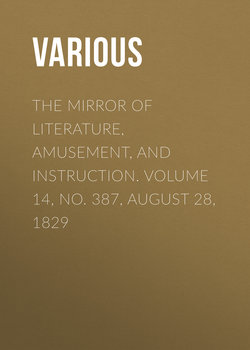The Mirror of Literature, Amusement, and Instruction. Volume 14, No. 387, August 28, 1829

Реклама. ООО «ЛитРес», ИНН: 7719571260.
Оглавление
Various. The Mirror of Literature, Amusement, and Instruction. Volume 14, No. 387, August 28, 1829
CONSTANTINOPLE
CONSTANTINOPLE
TWO SONNETS
ILLUSTRATION OF SOME OLD PROVERBS, &c
THE CONTEMPORARY TRAVELLER
JOURNEY IN SEARCH OF THE RED INDIANS OF NEWFOUNDLAND
THE SELECTOR, AND LITERARY NOTICES OF NEW WORKS
AN HONOURABLE "INDEPENDENT" FAMILY
PURSUIT OF KNOWLEDGE UNDER DIFFICULTIES
OLD POETS
SPIRIT OF THE PUBLIC JOURNALS
ARRIVAL AT MARGATE
THE UNICORN
THE GATHERER
A PUNSTER
PLAY BILL
PARIS
MOTTO AND TRANSLATION
DIALOGUE BETWEEN GLUTTON AND ECHO
EPITAPH ON A GAMESTER
LIMBIRD'S EDITION OF THE
Отрывок из книги
The splendour and extent of Constantinople are not within the compass of one of our pages; but the annexed Engraving furnishes some idea of a section of this queen of cities. It extends from Seraglio Point to the Janissaries' Tower, and though commanding only a portion of the city, includes the domes of the magnificent mosques of Santa Sophia and the Sultan Achmet, which rise from a vast assemblage of towers, palaces, minarets, &c. in every style of architecture.
We have so often and so recently touched upon the ancient and modern state of Constantinople, that we fear a recapitulation of its splendour would be uninviting to our readers.1 Nevertheless, as its mention is so frequently coupled with the seat of war, and the "expulsion of the Turks from Europe," our illustration will at this period be interesting, as well as in some measure, explanatory of the position of the city, which is so advantageous as to make it appear fit for the seat of dominion over the whole world. Can we then be surprised at its forming so tempting a lure to surrounding nations?
.....
Interment almost immediately follows upon the decease of the person; a practice common to all classes at Constantinople. The corpse is carried to the grave on a bier by the friends of the deceased: this is considered as a religious duty, it being declared in the Koran, that he who carries a dead body the space of forty paces, procures for himself the expiation of a great sin.3 The graves are shallow, and thin boards only, laid over the corpse, protect it from the immediate pressure of the earth, which is set with flowers, according to the custom of the Pythagoreans, and a cypress tree is planted near every new grave. As a grave is never opened a second time, a vast tract of country is occupied with these burial-fields, which add by no means to the salubrity of the vicinity. Much is gained, unquestionably, as regards the health of the inhabitants, by burying without the cities; but the shallowness of the graves contributes to render these vast accumulations of animal dust, at certain seasons more especially, a source of pestilential miasmata. The cemeteries near Scutari are immense, owing to the predilection which the Turks of Europe preserve for being buried in Asia—that quarter of the world in which are situated the holy cities, Mecca, Medina, Jerusalem, and Damascus. The author of Anastasius gives the following vivid description of this extraordinary spot:—
"A dense and motionless cloud of stagnant vapours ever shrouds these dreary realms. From afar, a chilling sensation informs the traveller that he approaches their dark and dismal precincts; and as he enters them, an icy blast, rising from their inmost bosom, rushes forth to meet his breath, suddenly strikes his chest, and seems to oppose his progress. His very horse snuffs up the deadly effluvia with signs of manifest terror, and, exhaling a cold and clammy sweat, advances reluctantly over a hollow ground, which shakes as he treads it, and loudly re-echoes his slow and fearful step. So long and so busily has time been at work to fill this chosen spot—so repeatedly has Constantinople poured into this ultimate receptacle almost its whole contents—that the capital of the living, spite of its immense population, scarcely counts a single breathing inhabitant for every ten silent inmates of this city of the dead. Already do its fields of blooming sepulchres stretch far away on every side, across the brow of the hills and the bend of the valleys; already are the avenues which cross each other at every step in this domain of death, so lengthened, that the weary stranger, from whatever point he comes, still finds before him many a dreary mile of road between marshalled tombs and mournful cypresses, ere he reaches his journey's seemingly receding end; and yet, every year does this common patrimony of all the heirs to decay, still exhibit a rapidly increasing size, a fresh and wider line of boundary, and a new belt of young plantations, growing up between new flower beds of graves.
.....